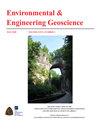Common Spring Types in the Valley and Ridge Province: There Is More than Karst
IF 0.7
4区 工程技术
Q4 ENGINEERING, ENVIRONMENTAL
引用次数: 3
Abstract
The Valley and Ridge Province (V&R) of the central Appalachians is rich in springs that support ecosystems, provide local water resources, and export water from the region. Although there has been extensive research on springs in the province, the focus has been on chemically variable karst springs. The purpose of this work is to identify common spring types found in the V&R based on an analysis of three regions. Three types of V&R springs are included in this comparison, and their relationship to more general classification systems is included. Headwater springs, located near ridge tops and along ridge flanks, are typically small, may be ephemeral, have localized flow paths, and are associated with siliciclastic units. Karst springs, generally located in the valleys, include both the more chemically variable limestone springs and the more stable dolomite springs. Thermal warm springs, with temperatures higher than the mean annual air temperature, are less common than the other spring types; they may be large and are typically associated with major thrust faults. The temperature, chemistry, and locations of the springs are controlled by the structural geology and topography as well as the formations and lithologies through which the recharge water travels. There is overlap in the water chemistry and storm responses of the spring groups, but some general trends can be identified, such as lower pH in the headwater springs. The V&R springs are critical resources, but their sustainability, chemistry, and hydrology need to be considered within the local geologic framework.谷岭省常见的泉水类型:岩溶不止
阿巴拉契亚山脉中部的山谷和山脊省(V&R)拥有丰富的泉水,这些泉水支撑着生态系统,为当地提供水资源,并从该地区出口水。虽然对该省的温泉进行了广泛的研究,但重点是化学变化的喀斯特温泉。这项工作的目的是根据对三个地区的分析,确定在V&R中发现的常见弹簧类型。三种类型的V&R弹簧包括在这个比较中,以及它们与更一般的分类系统的关系。位于山脊顶部附近和山脊两侧的源泉通常很小,可能是短暂的,有局部流动路径,并与硅塑性单元有关。岩溶泉一般位于山谷中,既包括化学性质变化较大的石灰岩泉,也包括化学性质较为稳定的白云岩泉。温度高于年平均气温的温泉比其他类型的温泉更少见;它们可能很大,通常与主要逆冲断层有关。泉水的温度、化学成分和位置由构造地质和地形以及补给水流经的地层和岩性控制。泉水群的水化学和风暴响应有重叠,但可以确定一些总体趋势,如源头泉的pH值降低。V&R泉水是至关重要的资源,但它们的可持续性、化学和水文需要在当地地质框架内考虑。
本文章由计算机程序翻译,如有差异,请以英文原文为准。
求助全文
约1分钟内获得全文
求助全文
来源期刊

Environmental & Engineering Geoscience
地学-地球科学综合
CiteScore
2.10
自引率
0.00%
发文量
25
审稿时长
>12 weeks
期刊介绍:
The Environmental & Engineering Geoscience Journal publishes peer-reviewed manuscripts that address issues relating to the interaction of people with hydrologic and geologic systems. Theoretical and applied contributions are appropriate, and the primary criteria for acceptance are scientific and technical merit.
 求助内容:
求助内容: 应助结果提醒方式:
应助结果提醒方式:


